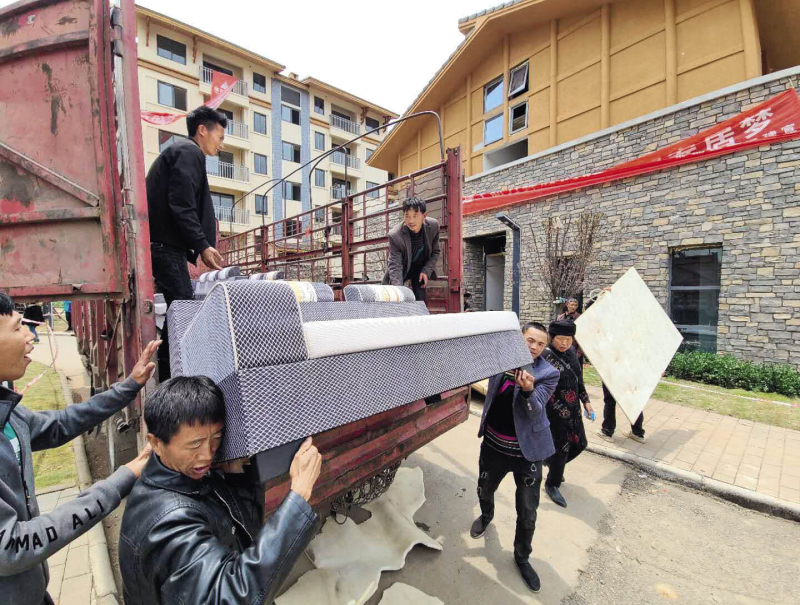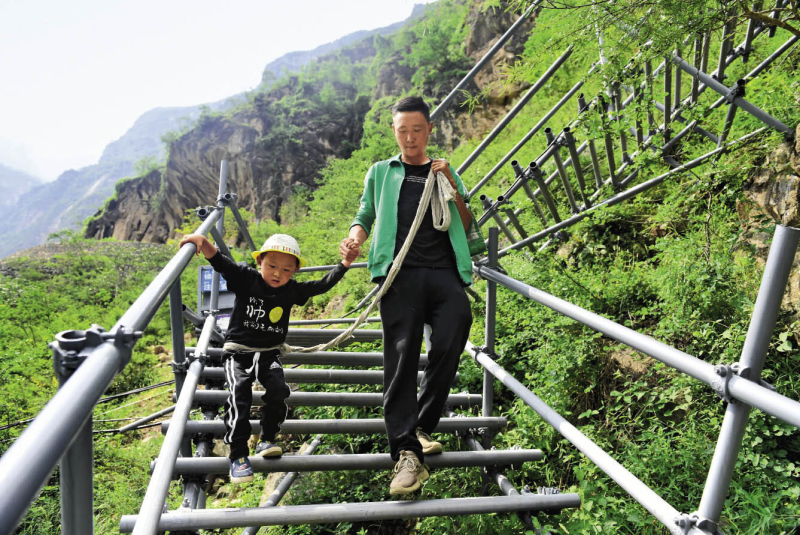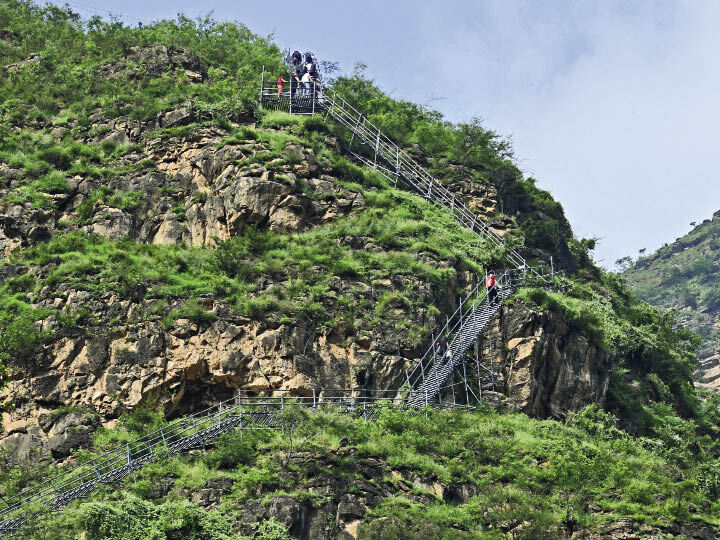HAVING a poor education, Mou’se Labo, a young shepherd of the Yi ethnic group, was resigned to living in the mountainous cliff village for life, never imagining he and his family would ever move into a new modern community at the foot of the mountain. His story of transitioning from rural life living in the clouds to an industrious online celebrity and tour guide is an example of how poverty reduction and innovation is changing China’s countryside and improving people’s livelihoods.
“Living Fossil” of Old Life
The “cliffside village” is another name for the Atulieer Village, Zhaojue County, Liangshan Yi Autonomous Prefecture, in southwest China’s Sichuan Province. This village is located in the Gulilada Grand Canyon, with sheer cliffs on three sides and mountains on the other. About 200 years ago, Mou’se Labo’s ancestors first made their homes on the cliff to avoid tribal wars.
“If you haven’t climbed the rattan ladder to Atulieer Village, you have never been to the Gulilada Grand Canyon.” This is a common saying among locals. In the past, most of the villagers lived at an altitude of more than 1,400 meters, which is nearly one kilometer from the ground — some even lived at an altitude of 2,400 meters.

Villagers are moving into new houses at a relocated community to start a new life on May 13, 2020.
Before 2016, 17 precarious rattan ladders were the only way locals could reach the outside world. The two closest to the village were almost vertical and measured about 100 meters in length. Villagers say that at least 10 people have fallen to their death off the ladders in the past.
More concerning was that because the local elementary school was at the foot of the mountain, children had to climb these 17 rattan ladders regularly to get to school and back.
Academics saw this village and its lifestyle as a slice of history showing how the Yi people lived in such a dangerous environment.
The living conditions of villagers drew the attention of Chinese President Xi Jinping. On March 8, 2017, when joining lawmakers from Sichuan Province for deliberations during the Fifth Plenary Session of the 12th National People’s Congress, Xi talked with delegates from Liangshan about the progress of poverty alleviation in places where Yi people gather. Xi said that he had seen media coverage on the cliffside village in Liangshan on TV programs, and was very concerned about the dangerous way in which locals had to move up and down the cliff face.
So, after three years, what is the situation of the village currently and have the villagers’ lifestyles changed?
No “Runaway Bride”
Zhaojue County, where the village is located, was the capital of Liangshan Yi Autonomous Prefecture for 27 years. It is the country’s largest county inhabited by the Yi ethnic minority, and a county with the largest minority population in Sichuan Province.
Getting to the cliffside village is quite a mission. From Zhaojue County, the heart of Daliang Mountains, one needs to travel eastward along the National Highway 348 and Provincial Highway S307 toward the mountains. The road narrows and becomes steeper. Until after about two hours of travel, the destination is reached — the foot of Lion Mountains of which the village is perched on the clifftop.

A villager and his son go downhill via the new steel ladder.
Today, the rattan ladders are gone and a steel ladder rises up until it fades from view into the clouds, attached on a nearly vertical cliff face. After climbing hundreds of steps, and seeing the Meigu River winding like a ribbon far below, our party is met by Mou’se Labo and his uncle Mou’se Wuha. Mou’se Labo has curly hair and a high nose, and wears the traditional earring of adult Yi men on his left ear.
“There was no regular teacher on the mountain. Having a poor school record, I could only go on to herd sheep and do gig jobs. [With little education], it was hard to find a job when I went to live and work in Guangdong Province and the pay was low,” Mou’se Labo said.
He said it was also not easy for a man on the mountain to find a woman to marry, even if you spent generously on betrothal gifts. Yet once married, divorce was rare because of the hard mission of ladder climbing, said Mou’se Labo, who is married and has three children.
According to Yi traditions, when the children grow up, the elderly parents will be supported by the youngest son. Because he lives separately from his elderly parents and is the youngest son, five years ago, Mou’se Labo returned to his hometown from his work in Guangdong to take care of his parents.
When he returned home, the village was no different from when he was a child. Mou’se Labo climbed the familiar rattan ladder to the family home on the clifftop. At that time, the adobe house was in disrepair, leaked water on rainy days, and let in cold air in winter. The house had no furniture except a welded bed. There was no electricity or running water in the village, let alone an Internet connection. Cultivating corn, and raising chickens and goats made a day. He ate potatoes every day. To sell chickens and goats, he had to tie them on his back and then climb down the mountain to get to the market. Even for a fit person like Mou’se Labo, it took him almost six hours to finish a trip. A big stress for him was often being taken advantage of because buyers knew it was physically difficult for him to take his produce back up the mountain and therefore offered him low prices for his goods.
Becoming an Online Celebrity
Over the years, the village has undergone tremendous changes. Since the construction of the steel ladder in 2016, the village has had access to electricity and the Internet with communication cables placed inside the steel ladder’ tubes. The village now also has tap water, a stable power supply, and full 4G network coverage. Smartphones are now popular among villagers, and drones are used to ship medical supplies between the two infirmaries on the mountain, delivering meds in 10 minutes. In particular, the steel ladder and 4G network have opened a window to the wider world for the villagers.
Workers who built the steel ladder also experienced unimaginable hardships. The construction teams invited from other areas all gave up, because they couldn’t cope with the difficulties. In the end, the building had to be done by local people. In July 2016, the local government invested a total of RMB 1 million to build the steel ladder. The steel tubes attached to the cliff form a total of 2,556 steps. The 1,500 steel tubes used in the construction totaled more than 40 tons in weight. Another more than 6,000 metal fasteners were used. All of the materials were carried up the cliff on the backs of locals.
“Shortly after the steel ladder was built, a serious landslide struck, destroying part of the original rattan ladders,” said Mou’se Labo.

On August 22, 2020, tourists experience the newly built steel ladder leading up to the cliffside village. Dong Ning
Mou’se Labo, known as the “cliff trapeze artist” for his dexterity, has developed his own way of using the ladder. Because he has been climbing since he was four, over the past 20 years, he has developed a unique style of going up the mountains using his hands and feet to move like a civet cat. When going downhill, he virtually slides down, depending on what he is carrying.
“Once I uploaded a video of walking on the handrail of the ladder and garnered millions of likes, but this is a dangerous move and cannot be imitated,” he said, smiling. After the steel ladder was completed, it took Mou’se Labo only 18 minutes to get from the village to the foot of the mountains, while the average person would take two hours.
Since he had worked outside of the village for a period of time, Mou’se was the best Mandarin speaker there, and was the first to try live streaming on social media platforms. He used his mobile phone to make short videos of his daily life, such as climbing ladders, attending to grazing cattle and sheep, as well as showing some of the mountain scenery. His posts quickly made him an online celebrity and influencer. Broadcasting for 30 minutes can now earn him hundreds of dollars. Recently, he has sold local products through livestreaming, such as honey, walnuts, green peppers, navel oranges, and olives. Due to the remote location and inconvenient transportation, the produce in the past lacked a suitable display platform and could not reach consumers.
In 2018, to tap the tourist potential of its unique geography, Zhaojue County introduced a tourism company to create a mountain resort project at the cliffside village. Mou’se Labo has become a popular travel guide by virtue of his climbing stunts and his popularity on the Internet. There is a viewing platform on the steel ladder named after Mou’se Labo, who was also invited by China Central Television to participate in a poverty alleviation TV program. The village has also gained online popularity and attracted many netizens to visit. Villagers opened small shops to serve tourists, and of course, all the goods were transported up the steel ladder.
Mou’se Subure, Mou’se Labo’s childhood friend, is another online celebrity in the village. Mou’se Subure, who only began livestreaming at the end of 2017, now has nearly 200,000 fans online. In addition to tips from fans, he also sells honey, about 40 to 50 kilograms a week. Mou’se Sabure collects honey from the mountains, packs it, and delivers it to buyers at the post office in the town. The whole process is live streamed. In addition, he also serves as a tour guide., All of these helped boost his monthly income to almost US $1,000.
Following Mou’se Labo and Mou’se Sabure’s examples, other villagers also improved their livelihoods. Chen Guji became a professional honey hunter, and the sales of wild honey bring him considerable income. Ede Laige cultivates green peppers and navel oranges. As the produce has easier access to the market, his income continues to rise.
Moving into New House
The biggest change in Mou’se Labo’s life occurred in May this year when 344 villagers in 84 households of the cliffside village moved into new homes 65 kilometers away on the outskirts of Zhaojue County. Their new homes are in the largest resettlement community under poverty alleviation program in Sichuan Province.
Mou’se Labo and his parents, wife and children dressed in their traditional Yi costumes for the important occasion. Their new apartment measures 100 square meters in size. It has three bedrooms, one living room, a kitchen, and a bathroom. They didn’t bring a lot of household items, because the government had already provided such large items as beds, kitchen cabinets, tables, and chairs, and they only needed to buy home appliances.
Since then, Mou’se Labo has been traveling back and forth between the cliffside village and the new residence. While enjoying the convenience of an urban life, he is able to keep the traditions of his people and turn the scenery and culture back home on the clifftop to sources of income by developing tourism.
“The cliffside village will not disappear, and the steel ladder will not go deserted. From now on, it will become the most representative tourist attraction in Zhaojue County,” said Azi Aniu, secretary of the Party committee of Zhiermo Township, where the village is located.
“A national forest park will be built here in the future. The magnificent environment is absolutely worthy [of it],” said Pacha Youge, head of Zhiermo Township. There is also a plan to build 45 tourist homestays in the cliffside village, develop karst caves and hot springs in the grand canyon, and design hiking trails. In addition, two sightseeing cable cars will be built to provide a complete tourist experience.
“When you come back in the near future you can take the cable car to the top of the mountain. Then, I will meet you in the clouds, and we can see stars at night, sunrise in the morning, and the sea of clouds during the day,” Mou’se Labo told our visiting group. This is an invitation that cannot be passed up.
_______________
WANG ZHE is a reporter with China Report magazine.